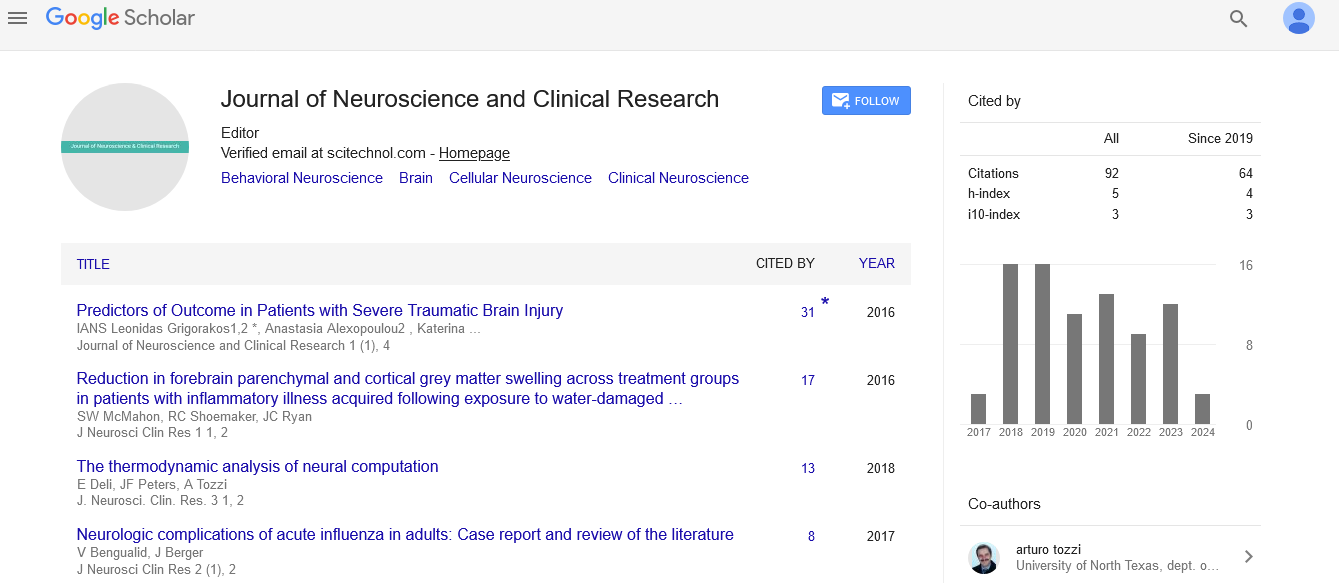Editorial, J Neurosci Clin Res Vol: 5 Issue: 3
Neuroscience Fills in China
Danielle Brown*Department of Genomics, Imperial College London, London
*Corresponding Author : Danielle Brown
Department of Genomics, Imperial College London, London, UK
E-mail: Danielleb024@gmail.com
Received Date: October 1, 2020; Accepted Date: October 10, 2020; Published Date: October 17, 2020
Citation: Danielle B (2020) Neuroscience Fills in China. J Neurosci Clin Res 2020, 5:3.
Keywords: Neuroscience
Editorial
Following twenty years of period of prosperity, China has rededicated itself to science. Neuroscience has profited gigantically, as anybody perusing the writing can't neglect to take note. A lot of this advancement has been driven by a little gathering of unfamiliar prepared researchers who have matched up with organizations in China, and, from the safe vantage purpose of tenured situations in the United States, taken on the Chinese administration to infuse beforehand unimaginable proportions of logical freedom and intensity. The Institute of Neuroscience in Shanghai, established in 1999 and drove by Berkeley's Mu-ming Poo, has roused change of existing organizations and the foundation of more current ones. The National Institute of Biological Sciences, opened in 2004 on the edges of Beijing and drove from a remote place by Xiaodong Wang of the University of Texas Southwestern, is displayed on the Howard Hughes Medical Institute.
It offers liberal help to promising researchers without endorsing activities or approaches, in polar differentiation to the applied science generally preferred by Chinese 15-year plans, which actually represent most of accessible exploration reserves. Legitimacy is dictated by execution surveys including global logical sheets, another idea that is new to Chinese science. These organizations and the respected tip top foundations in Beijing and Shanghai draw in effective Chinese neuroscientists from abroad. The current US financing crunch helps, however so does Chinese liberality through projects, for example, the Chinese Academy of Science's Hundred Talents Plan, the Natural Science Foundation of China's Outstanding Young Scientist program and the Changjiang Professorship from the Ministry of Education. Alongside sufficient assets, Chinese-conceived neuroscientists are pulled in home by brilliant and energetic understudies. Expanding on a long custom of learning and grant, understudies must score splendidly in thorough assessments to be admitted to the best colleges. Millions take the tests, so graduate projects and foundations approach many roused understudies. In the United States, it takes long stretches of effective work to assemble a huge gathering, though this can happen significantly more rapidly in China. When they are at a world class Chinese establishment, many alumni understudies put their focus on moving toward the West, especially the United States.
As of late, the United States has given in excess of 20,000 visas every year to Chinese understudies over all fields. Yi Rao, who returned in August to become Dean of Life Sciences at Beijing University after a famous lifetime in the United States, takes note of that about half of the applications to the neuroscience graduate projects at Washington University and Northwestern University come from terrain China. Unquestionably, the effect of Chinese understudies and postdocs in US neuroscience labs is extensive. Not many of these understudies, notwithstanding, return home to China, bringing about a considerable loss of ability to their nation.
As circumstances have expanded, the world class establishments have gotten progressively specific. Liqun Luo of Stanford University accepts that appealing situations in Beijing and Shanghai are presently no less serious than US residency track occupations. China, obviously, is a lot greater than simply Beijing and Shanghai. The colleges of commonplace capitals, urban areas with a great many occupants and a huge number of understudies, actually anticipate the deluge of current life sciences. A few areas have now dedicated assets. Bai Lu of the US National Institute of Child Health and Human Development believes that promising neuroscience programs are sprouting in Xi'an (Shaanxi region in focal China), Guangzhou (the southern Guangdong area) and Chengdu (southwestern Sichuan region).
 Spanish
Spanish  Chinese
Chinese  Russian
Russian  German
German  French
French  Japanese
Japanese  Portuguese
Portuguese  Hindi
Hindi 